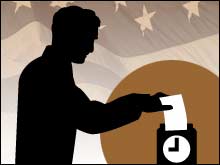Paid sick leave may be next big causeNational movement gets lift after San Francisco passes ordinance mandating leave to all workers.NEW YORK (CNNMoney.com) -- A national movement to mandate paid sick leave for all workers has gotten a lift from a proposition passed by San Francisco voters this month. Under Proposition F, all businesses with 10 or fewer workers must provide up to 40 hours of paid sick leave a year to employees, while larger companies must guarantee up to 72 hours.
Workers get one hour of sick leave for 30 hours worked, beginning 90 days after the employee starts at the company. The hours will carry over year to year, but never exceed the cap. Unlike some plans in force, employers won't pay out for unused time off when a worker leaves the company. Proposition F, which passed with just over 60 percent of the vote in San Francisco, makes it legal for workers to take the leave not just for themselves but to care for any child, parent, spouse, domestic partner or other designated relative. Employers that already provide paid sick leave at the levels outlined in the ordinance are exempted. The umbrella organization that pushed for Proposition F, the Coalition for Paid Sick Days, counts among its members Young Workers United, a youth immigrant worker advocacy organization; Parents Voice, which supports affordable child care; the Chinese Progressive Association, and the Service Employees International Union. Sara Flocks, an organizer from Young Workers United, says there are state and city efforts to enact similar legislation in Maine, Massachusetts, Wisconsin. Vermont, Washington DC and other places. Flocks says Proposition F represents using "policy to increase the most basic rights laborers have," noting the idea for paid sick days came from polling restaurant and retail workers after a successful minimum wage campaign in San Francisco in 2002. "There's very much a correlation between the two," she said. The local measure mimics the strategy used by the raise-the-minimum-wage campaigns that first targeted the wages of specific industries in specific cities. Raise-the-minimum-wage campaigns proved to be the first wave of a movement that eventually caught on at the state level in the late 1990s, and resulted in Ohio, Arizona, Missouri, Nevada, Montana, and Colorado passing minimum wage hikes in the 2006 midterm election. A total of 29 states currently have a minimum wage higher than the federal level. After winning control of the House and the Senate for the first time in 12 years, the Democrats are expected to pass a minimum wage bill when the new Congress convenes in January Among the opponents to paid leave are groups representing small business. "For the most part, politicians and the public will view this as too interventionist and an unnecessary burden on small business," said Karen Kerrigan, President & CEO of the Small Business & Entrepreneurship Council. With the Democratic takeover of Congress, it may not take a grassroots move to make paid sick days mandatory. Sen. Edward Kennedy, D-Mass., and Rep. Rosa DeLauro, D-Conn., introduced the Healthy Families Act in 2005 to create legislation at the federal level to do what Proposition F will do in San Francisco. The Healthy Families Act will "guarantee working Americans seven paid sick days to care for their own and their families' medical needs," according to a release from the senator's office. Kennedy has listed the Healthy Families Act as a legislative priority for Congress in 2007. A spokeswoman at DeLauro's offices says the congresswoman plans to do the same. Health care watchers say the ordinance is about issues bigger than just paid-leave. "San Francisco is saying they don't want to sanction business models that can only survive with no paid sick leave," said Len Nichols, director of the health policy program at the non-partisan New America Foundation. "This raises larger questions about what society can and cannot do to guarantee a decent standard of living to all workers, and those are important questions to raise at all levels of government these days." Opponents of the paid-leave ordinance are not sure the legislative approach - be it local, state or federal - will catch on. "Mandates at the local and state level always have the potential to build momentum for action at the federal level," Kerrigan said. But she pointed out, "San Francisco has laws and mandates that simply wouldn't cut it anywhere else. While other liberal cities, or states for that matter, may think this mandate is a great model, most will not view it that way." -------------------------------------------------------------- |
|

